[vc_row][vc_column][vc_single_image image=”949″ img_size=”full” alignment=”center”][vc_custom_heading text=”“A Piece of My Mind”” font_container=”tag:h1|font_size:50px|text_align:center|color:%232633ef” google_fonts=”font_family:Bitter%3Aregular%2Citalic%2C700|font_style:700%20bold%20regular%3A700%3Anormal”][vc_custom_heading text=”May 2022 Newsletter” font_container=”tag:h1|font_size:30px|text_align:center|color:%232633ef” google_fonts=”font_family:Bitter%3Aregular%2Citalic%2C700″][/vc_column][/vc_row][vc_row][vc_column width=”2/3″][vc_column_text]
Advancing Christian Faith and Values,
Defending Religious Liberty for All,
Supporting Civility and the Common Good
through Preaching, Teaching, Writing, Activism and Reasoned Conversations
www.donaldshoemakerministries.com[/vc_column_text][/vc_column][vc_column width=”1/3″][vc_single_image image=”1304″ img_size=”full” alignment=”center”][/vc_column][/vc_row][vc_row css=”.vc_custom_1598373738095{border-radius: 3px !important;}”][vc_column][vc_column_text]

Our Front Garden
Responding to Suffering in Ukraine
“We prayed to our God and posted a guard day and night to meet this threat.” – Nehemiah 4:9
Governor Nehemiah was sent by the King of Persia to oversee rebuilding of Jerusalem’s wall. People in surrounding nations opposed this effort with their insults and threats of violence. So Nehemiah followed his two-pronged response— Prayer and Action.
Often our promise to pray (which we may forget to do anyway) becomes our excuse to do nothing else! Let’s respond to the Ukraine tragedy as Nehemiah would—prayer AND effective actions, especially defensive (by governments) and assistance actions by us all. (See good giving options at the end of this newsletter.)[/vc_column_text][vc_column_text]
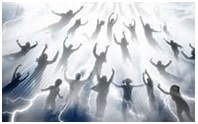 For Me, The “Rapture” Is Up in the Air!
For Me, The “Rapture” Is Up in the Air!
By Donald Shoemaker
In my early Christian experience it was a “given,” as surely as “Jesus died for our sins” is a “given,” that the “Rapture of the Church” would precede a 7-year Great Tribulation on earth. This is what, I was sure, the Bible taught as a key feature of “the end times.”
During the Tribulation period “The Antichrist” will dominate the world and persecute the People of God (converts to Jesus during that period). At the end of this Tribulation, Jesus will return with his raptured church to earth from heaven in power and great glory, to judge those living at that time and to inaugurate his Kingdom on earth (“The Millennium”).
In short, the “Church” will be absent from the world during the Tribulation period when the Antichrist rules. We had charts that made this clear. In fact, I made my own chart from 20 feet of meat wrapping paper taken from the grocery store where I worked and I hung it up at the front of each church service during my summer-long series of prophecy sermons!
This teaching was as certain to me as “God so loved the world that he gave his only-begotten Son.” The “Pre-trib Rapture of the Church” was locked into innumerable doctrinal statements in churches, Christian schools and ministries. I once saw a church’s list of membership requirements. One was, you had to believe that a list of prophetical events like the Rapture would happen in exactly a certain order or you could not join that church.
I expressed such thinking once in a parody of a Gospel Song. Try singing it at your church!
When He shall come with trumpet sound
I’ll leave ere Satan stalks the ground.
The “times and seasons” will unfold
Just like our charts have long foretold.
But this doctrinaire eschatology began to unravel in my mind over time. Briefly:
1. I made some words of Jesus central to my thinking about prophecy: “It is not for you to know the times or dates the Father has set by his own authority” (Acts 1:7).
2. As my circles of Christian fellowship and academic study grew broader, my understanding of what is theologically and spiritually essential relaxed (some would call this a spiritual problem rather than healthy growth). I also came to realize I had not been exposed to or taught alternate views on prophecy very objectively.
3. I once took a week to read two books on the “Rapture” with two different views: (1) The Rapture Question by John Walvoord (teaching a pre-tribulation Rapture) and (2) The Blessed Hope by George Ladd (teaching a post-tribulation Rapture). I found Ladd’s spirit to be one of gracious academic inquiry and Walvoord’s teaching to be…well, I thought, “Aren’t there any better proofs than these?”
4. I became convinced there needed to be a “hierarchy” of doctrinal positions. Namely, (1) essential doctrines, core teachings that are scriptural beyond a reasonable doubt; (2) likely doctrines, which seem supported by a preponderance of biblical evidence; (3) less certain areas of belief, where (so far as prophetic teaching is concerned) we’ll have to “wait and see.” We don’t need to get in a tizzy over #3 things, as if “The Faith” sinks or swims over them. (As one example, I’d place Holy Communion as an institution the church should observe as a #1 teaching; the exact understanding of its sacramental significance as a #2 teaching; and decisions such as how [wine or juice, with or without a meal?], or when Communion is to be observed [weekly or monthly or…?] into #3 category of teachings.)
I know some think “all doctrines are equal and level” and “the more spiritual you get, the deeper your certainties become.” But this isn’t good thinking. The Apostle Paul set forth flexible application of doctrine to ministry (1 Corinthians 9:19-22) and non-judgmentalism in observances for the sake of church unity (Romans 14). Both of these required doctrinal assessments on Paul’s part. Paul also set forth a major caution that should give us pause (“Now we see only a reflection as in a mirror; then we shall see face to face. Now I know in part; then I shall know fully, even as I am fully known.” – 1 Corinthians 13:12).
At this point I’d like to offer a perspective on “doctrinal hierarchy” set forth in a recent book by Gavin Ortlund, Finding the Right Hills to Die On—The Case for Theological Triage (Crossway, 2020), p. 19.
• First-rank doctrines are essential to the gospel itself.
• Second-rank doctrines are urgent for the health and practice of the church such that they frequently cause Christians to separate at the level of local church, denomination or ministry.
• Third-rank doctrines are important to Christian theology, but not enough to justify separation or division among Christians.
• Fourth-rank doctrines are unimportant to our gospel witness and ministry collaboration.
When it comes to prophecy issues, I would make the Second Coming of Christ, Resurrection and Final Judgment first-rank doctrines. I would place the debates over the Millennium (the extent to which God’s Kingdom is “already here” or “not yet” and the details of a Millennium before/after Jesus’ return) into the second or third rank. I would place debates over the timing of the Rapture as it relates to the Tribulation and various other “prophetic happenings” into the third or fourth rank.
A final comment at this point: Christian orthodoxy confesses in the words of the Nicene Creed (AD 325), “one holy catholic and apostolic church.” This teaches me that a doctrine worth our strong embrace is grounded in apostolic teaching and broadly held throughout the orthodox (small “o”) Christian world. A so-called “Bible prophecy insight” that pops up late in time within a narrow segment of the Christian community fails these tests.
NEXT MONTH: The Second Coming of Christ and the Rapture in Paul’s Thessalonian Letters[/vc_column_text][vc_column_text]The Psalms—The First Christian Hymnbook – 4th Essay on Worship for 2022
I have about 20 hymnbooks in my theological library at home. Over my years as a pastor my robust singing congregation welcomed older hymns into worship services alongside fine contemporary songs. The heritage of song today’s churches have is a rich resource (sadly becoming underutilized). First Century Christians didn’t have 20 hymnbooks, but they did have one that was unparalleled and unrivaled: the Book of Psalms. Old themes ever new.
When the “Jesus Movement” happened in the late 1960’s and after, an amazing trend took place. Many Christians began to sing the Psalms! Others expanded their psalm-singing. Composers put the Psalms (as written in the poetic elegance of the King James Version) to simple, delightful tunes.
Thy lovingkindness is better than life;
Thy lovingkindness is better than life.
My lips shall praise thee, thus will I bless thee;
I will lift up my hands unto thy name.
(from Psalm 63:3-4; sung antiphonally)
Today’s church continues to benefit, though I sense the singing of Psalms has waned somewhat. Sad. Let’s reverse this decline!
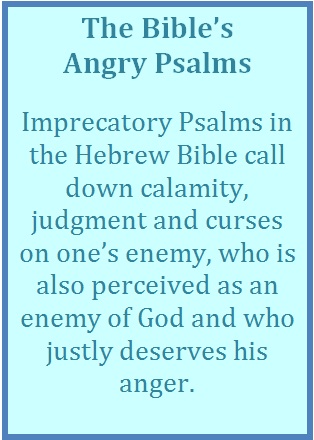 We start with one kind of psalm that is incredibly relevant given the bloodshed in Ukraine. We call them “Imprecatory Psalms” – psalms that call for death and pain on those who work evil in the world (“Imprecation” – what invokes a curse or pronounces a judgment). “Pour out your indignation on them, and let your burning anger overtake them” – Psalm 69:24.
We start with one kind of psalm that is incredibly relevant given the bloodshed in Ukraine. We call them “Imprecatory Psalms” – psalms that call for death and pain on those who work evil in the world (“Imprecation” – what invokes a curse or pronounces a judgment). “Pour out your indignation on them, and let your burning anger overtake them” – Psalm 69:24.
Here is quite a list of Imprecatory Psalms:
Psalm 5:8-10; Psalm 6:8-10; Psalm 11:5-7; Psalm 12:3-4; Psalm 35; Psalm 37; Psalm 40:14-15; Psalm 52:1-7; Psalm 54; Psalm 56:1-7; Psalm 57:1-4; Psalm 58:6-11; Psalm 59; Psalm 69:23-28; Psalm 79; Psalm 83:9-18;
Psalm 94; Psalm 137:7-9; Psalm 139:19-22; Psalm 143.
Some Imprecatory Psalms record the cry of the psalmist for vengeance. Some express what God will do. What are we to make of these psalms?
• They express the pain of a person seriously grieved by another.
• They call for judgment from God, whom we know is just and fair.
• They may question why God seems to delay or not care when wicked people cause good people to suffer.
Imprecation can even be found in the New Testament. “And when he had opened the fifth seal, I saw under the altar the souls of them that were slain for the word of God, and for the testimony which they held: And they cried with a loud voice, saying, How long, O Lord, holy and true, dost thou not judge and avenge our blood on them that dwell on the earth?” (Revelation 6:9-10 KJV).
Let’s be honest. We’ve all felt like pronouncing an imprecation on someone. We may feel that way right now against those who attack the innocent in Ukraine, or who commit crimes of violence on our streets and sidewalks. When evil seems to triumph, we should imprecate! And what could be a better way than to use the imprecations found in the Psalms?
Praying an imprecatory prayer should be part of our “toolbox” as we confront evil or suffer under it obediently—it’s not “unspiritual” so to pray. “If it is possible, as far as it depends on you, live at peace with everyone [but not all will live at peace with you!]. Do not take revenge, my dear friends, but leave room [step aside] for God’s wrath, for it is written: ‘It is mine to avenge; I will repay,’ says the Lord” (Romans 12:18-19 NIV).
This the Lord hates; it is an abomination to him:
“Hands that shed innocent blood” – Proverbs 2:17
Imprecation:
“God, lead us to hate what you hate.
Bring your wrath and judgment on those who
shed innocent blood in our world today.”
Imprecation songs are hard to find today. This Thanksgiving hymn is close:
For the Lord our God shall come, and shall take his harvest home.
From his field shall in that day all offenses purge away.
Give his angels charge at last to the fire the tares to cast…
We cannot cover all the themes in the Psalms. Here are some great ones:
PSALMS OF LAMENTATION (Psalm 137:1-4; see Psalm 42:4)
By the rivers of Babylon, there we sat down,
yea, we wept, when we remembered Zion.
We hanged our harps upon the willows in the midst thereof.
For there they that carried us away captive required of us a song;
and they that wasted us required of us mirth, saying,
“Sing us one of the songs of Zion.”
How shall we sing the Lord’s song in a strange land?
Her own disobedience plus the power of a pagan nation had deprived Israel of her homeland AND her expressive worship. When oppression by others or by Covid, or when our own disobedience prevents us from worshipping as we ought, there should be cries of lamentation.
PSALMS OF CONFESSION (Psalm 32:1-5; see Psalm 51)
Blessed is he whose transgressions are forgiven, whose sins are covered…
When I kept silent, my bones wasted away through my groanings all day long,
For day and night your hand was heavy upon me…
Then I acknowledged my sin to you and did not cover up my iniquity.
I said, “I will confess my transgressions to the LORD”
And you forgave the guilt of my sin.
Sin is our ongoing experience, and confession of it to God is essential (1 John 1:9). So words from the Psalms are there to assist us in our necessary task.
PSALMS OF FRUSTRATION (Psalms 42, 55 and 73)
• Over the success of the wicked while my life seems so unfair (Psalm 73).
• When life doesn’t show me there really is a God who cares (Psalm 42).
• When a good friend fails me (Psalm 55:1-4). Jesus, of course, is the one truly betrayed by one close to him—this psalm was fulfilled in Jesus’ experience. He knew what it meant to be abandoned by friends—for them not to be “there” as they promised, when he needed them.
• When God seems to have forsaken us (Psalm 22:1-2).
The Psalms call us to honesty—about life, ourselves, others. Even about God as we are experiencing him. The Psalms keep us from pious platitudes that so often seem to mark our public prayers and testimonies.
PSALMS CELEBRATING GOD’S CREATION (Psalm 19:1-6; Psalm 104)
The heavens declare the glory of God! On the earth God constantly displays his care for humankind and for all the creatures he has made.
Psalm 19 song: “The Heavens Are Telling” (Joseph Haydn)
Psalm 104 songs: “All Creatures of Our God and King” (Francis of Assisi)
“I Sing the Mighty Power of God that Made the Mountains Rise” (Isaac Watts)
“Shout to the Lord” (Hillsong) and “God of Wonders” (Chris Tomlin)
PSALMS TEACHING THE ART OF WORSHIP
• Worship with sincere and longing hearts (Psalm 42:1-4).
• Worship in a spirit of unity (Psalm 133). Now, this needs attention!
• Worship with lots of gusto! (Psalm 33:1-3 commands four important essentials in worship music: skill (on musical instruments used in worship), freshness, joy and fervor. Psalm 63 calls for uplifted hands and lips of praise. Psalm 150 – “Praise him with trumpet, harp, lyre, tambourine, strings, flute, cymbals. Praise him in the dance.”)
Virtually all the instrumentation and forms of worship in Psalm 150 have been criticized or even banned by churches at one time or another.
King David’s wife Michael criticized his exuberant worship. Kill-joys like her have served on many a church’s worship committee!
Finally, scripture teaches us to sing in psalms and hymns and spiritual songs (Ephesians 5:19; Colossians 3:16). Christians and the churches they belong to will be enthusiastic worshippers if they are filled with the Spirit and the Word of Christ, and obey the psalms they read and sing. I for one cannot understand how a church that sings the psalms could abandon the use of musical instruments, as if God didn’t welcome them in worship.
Next month: “Day of Rejoicing: Worship in the Book of Nehemiah”
Please read Nehemiah 12 and continue with me on this pilgrimage![/vc_column_text][vc_row_inner][vc_column_inner][vc_column_text]Religious Liberty Vigilance –
Religious Education’s Right to “Keep the Faith”
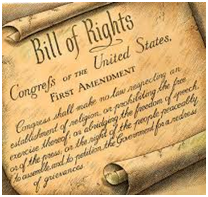 “Congress shall make no law respecting an establishment of religion, or prohibiting the free exercise thereof, or abridging the freedom of speech, or of the press; or the right of the people peaceably to assemble, and to petition the Government for a redress of grievances.”
“Congress shall make no law respecting an establishment of religion, or prohibiting the free exercise thereof, or abridging the freedom of speech, or of the press; or the right of the people peaceably to assemble, and to petition the Government for a redress of grievances.”
– 1st Amendment
On March 29, 2022 the Vatican issued a document spelling out what it means for a Catholic school to maintain its “Catholic Identity.”
“The whole school community is responsible for implementing the school’s Catholic educational project as an expression of its ecclesiality and its being a part of the community of the Church,” the document said. “Everyone has the obligation to recognize, respect, and bear witness to the Catholic identity of the school, officially set out in the educational project,” it continued. “This applies to the teaching staff, the non-teaching personnel, and the pupils and their families” [emphases mine].
Difficult problems arise if a church or religious school drifts from its basic commitments and allows its hiring practices to erode. Hiring teachers and others who don’t adhere to the institution’s religious identity will lead to a crisis if a church reformer later wants to restore the school to its roots. Witness the pushback from teachers and even (inappropriately) government officials in 2015 when Archbishop Cordileone of San Francisco set out to reestablish faculty commitment to Catholic teachings and values.
What religious freedom arguments are the courts likely to accept when a church or religious institution asserts its right to uphold its teachings and values in its employment practices?
* (1) The “Ministerial Exception” – Is the employee a minister? If the employee has important religious responsibilities, that person is a “minister” (even though not “ordained”) and the organization has an unqualified right to determine what standards should apply.
* (2) If the employee is not a “minister”, what still might protect the religious organization?
• Title 7 of the Civil Rights Act of 1964 protects employees from discrimination. But it has an exemption: religious organizations may choose to hire people who uphold the observances, practices and beliefs of a particular religion.
• The Religious Freedom Restoration Act (1993) prevents the federal government from interfering with the operations of a religious organization unless the state can establish a “compelling state interest” and when the state’s action is narrowly tailored.
• Doctrine of Church Autonomy – Government allows religious organizations to define their own answers to: “What is this religious community?”
• Doctrine of Expressive Association – The government must not force a religious organization to accept people who would undermine its expressive message.
• Entanglement – The Establishment Clause required that Government must not entangle itself with religion’s inner workings. The definitive decision on this is Lemon v. Kurtzman (1971).
What I find remarkable is how supportive the U.S. Supreme Court has been in the protection of religious values. Of twenty cases* before the U.S. Supreme Court in the past decade, nineteen decisions have come down on the side of religious freedom. Of these, fifteen were supermajority victories; only four were decided 5-4.
* Source for information in items (1) and (2) and on the twenty cases before the Supreme Court: My personal notes from “Current Key Religious Freedom Cases” by Luke Goodrich, J. Reuben Clark Law Society-Orange County Annual Religion and the Law Symposium, March 30, 2022. The comments for the speaker’s bullet points on “the Civil Rights Act,” “RFRA” and “Entanglement” are my own.
 [/vc_column_text][/vc_column_inner][/vc_row_inner][vc_row_inner][vc_column_inner][vc_column_text]A Personal Memorial Day Message
[/vc_column_text][/vc_column_inner][/vc_row_inner][vc_row_inner][vc_column_inner][vc_column_text]A Personal Memorial Day Message
 Pastors, Churches, Veterans, Active Military Personnel, Others who should be interested –
Pastors, Churches, Veterans, Active Military Personnel, Others who should be interested –
Are you supporting our Military Chaplains*?
Military chaplains play a vital role in the lives of our men and women in uniform through encouragement, care during trauma, prayer, teaching, leading worship services and providing other non-sectarian forms of support.
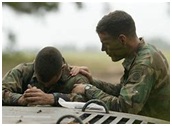 Imagine a chaplain putting his own life at risk during a serviceman’s final moments of life on the field of battle, leading the mortally wounded soldier in “The Lord’s Prayer.” Or providing solace to a soldier who has just lost his buddy in conflict. It happens.
Imagine a chaplain putting his own life at risk during a serviceman’s final moments of life on the field of battle, leading the mortally wounded soldier in “The Lord’s Prayer.” Or providing solace to a soldier who has just lost his buddy in conflict. It happens.
 My own denomination supports military chaplains through a ministry known as The Eagle Commission (www.eaglecommission.org). More pastors and churches in my denomination need to get behind The Eagle Commission through congregational education, prayer and financial support.
My own denomination supports military chaplains through a ministry known as The Eagle Commission (www.eaglecommission.org). More pastors and churches in my denomination need to get behind The Eagle Commission through congregational education, prayer and financial support.
What is your denomination or church doing to support chaplains?
* Note: Military chaplains are commissioned officers and appropriately compensated by the government. Support of chaplain ministries covers recruitment and scholarship programs for future chaplains, expenses of a denomination’s endorsing agent, travel expenses to denominational conferences, and much more.
[/vc_column_text][/vc_column_inner][/vc_row_inner][vc_column_text]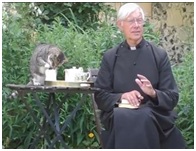 Dean of Canterbury Cathedral to Retire
Dean of Canterbury Cathedral to Retire
Robert Willis, Dean of Canterbury Cathedral since 2001, will retire on May 16, one day before his 75th birthday.
When “Covid” hit, Dean Willis began his daily “Garden Prayer Service” on YouTube, in various settings of the cathedral grounds surrounded by flowers, animals and birds. We have watched these inspiring programs often. Most Sundays after our own church service we watch his Sunday Garden Service and often watch morning worship in the Cathedral afterward.
I encourage you to take in some of his services before May 17. Simply go to “Canterbury Cathedral” on YouTube.
Give with Confidence for Ukrainian Relief:
 Samaritans Purse
Samaritans Purse
www.samaritanspurse.org
Slavic Gospel Association
www.sga.org
Encompass World Partners
www.encompassworldpartners.org
World Vision
www.worldvision.org
www.donaldshoemakerministries.com
Contact me at: donaldshoemakerministries@verizon.net
Don has been a member of the clergy in the Long Beach, California area since 1970. He now serves as Pastor Emeritus of Grace Community Church of Seal Beach (where he was senior pastor 1984-2012) and as Senior Chaplain of the Seal Beach Police Department (2001+). He previously was an assistant professor of Biblical Studies at Biola University (1976-84) and chaired the Social Concerns Committee in the Fellowship of Grace Brethren Churches from 1985 to 2019. His graduate work includes a Master of Divinity from Grace Theological Seminary, a Master of Theology from Fuller Theological Seminary with a concentration in Christian ethics, and a Doctor of Ministry from American Baptist Seminary of the West (now Berkeley School of Theology) with a concentration on the Charismatic Movement. His law school studies included a course on the First Amendment. He and his wife Mary have been married for over 55 years. They have 2 children and 6 grandchildren.
© 2022 Donald P. Shoemaker[/vc_column_text][/vc_column][/vc_row]

